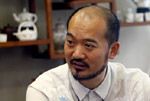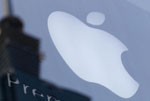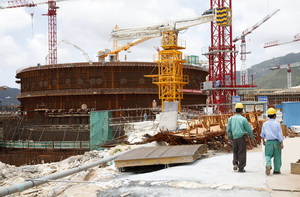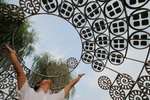Apple to discuss suppliers' alleged pollution with NGO
Updated: 2011-09-01 09:10
By Zhou Wenting (China Daily)
|
|||||||||||
BEIJING - The technology giant Apple Inc proposed on Wednesday to hold a conference call with various environmental protection organizations to discuss their recent findings about its suppliers, which are accused of emitting large amounts of pollution and threatening the public's health.
"We would be interested in hearing more specifics on what you have discovered about these suppliers," Apple's supplier responsibility department said in an e-mail.
 |
|
People walk inside an Apple retail store in Shanghai on Aug 25, 2011. [Photo/Agencies] |
The e-mail was sent to the Institute of Public and Environmental Affairs, a Beijing-based non-government organization (NGO), which is one of five organizations that carried out a 7-month investigation into pollution that has been released by Apple suppliers on the mainland.
The inspectors looked at 22 plants that are believed to be suppliers of the company. A report compiled from that work blames the suppliers for releasing large amounts of pollution in China.
"For example, the Meiko Electronics (Guangzhou Nansha) Co Ltd has been penalized for more than 10 environmental violations in recent months," according to the report.
"The company refuses to make the identities of suppliers public and to fulfill its responsibility to disclose information about the environmental effects of the suppliers' actions," said Ma Jun, director of the Institute of Public and Environmental Affairs.
Without public supervision, suppliers are more likely to believe they can get away with releasing large amounts of hazardous waste, he said.
Apple said on Wednesday that it is committed to "maintaining the highest standards for social responsibility throughout its supply chain".
"We require that our suppliers provide safe working conditions and use environmentally responsible manufacturing processes wherever Apple products are made," said Huang Yuna, who is in the company's public relations department.
Environmental organizations have detected heavy metals, including copper and nickel, in water coming from a Meiko Electronics (Wuhan) Co Ltd plant, an Apple supplier in Hubei province. What's more, sediment samples taken from near the supplier's plant contain from 56 to 193 times the amount of copper found in the middle reaches of the Yangtze River, where much sewage is eventually discharged, the report said.
"We drink polluted water, and the next generation will possibly drink poisoned water," Wan Zhengyou, a Wuhan fisherman told the environmentalists.
Tongxin, a village in Jiangsu province, is near the Kaedar Electronics (Kunshan) Co Ltd, another Apple supplier. When representatives of Green Stone, an environmental organization, visited in April, villagers there complained about breathing foul-smelling air.
"Only about 50 people live in the village, and nine of them have had cancer," said Li Chunhua, a Green Stone campaigner who conducted an inspection at the Kaedar plant.
Lawyers called on Apple to fully accept its social responsibilities, even though it does not necessarily have to pay compensation for any misdeeds committed by its suppliers.
"A well-known international brand should have done more than what people had expected," said Yi Shenghua, a lawyer at Beijing Yingke Law Firm. "It is certainly supposed to do better than others."
The environmental organizations said they hope buyers of electronic devices make "green" choices that help Apple establish a supply chain that does not harm the environment.
"We believe Apple customers cannot accept the fact that these faddish gadgets are made at the cost of poisoning the environment, harming communities, and sacrificing employees' rights," Ma said.













